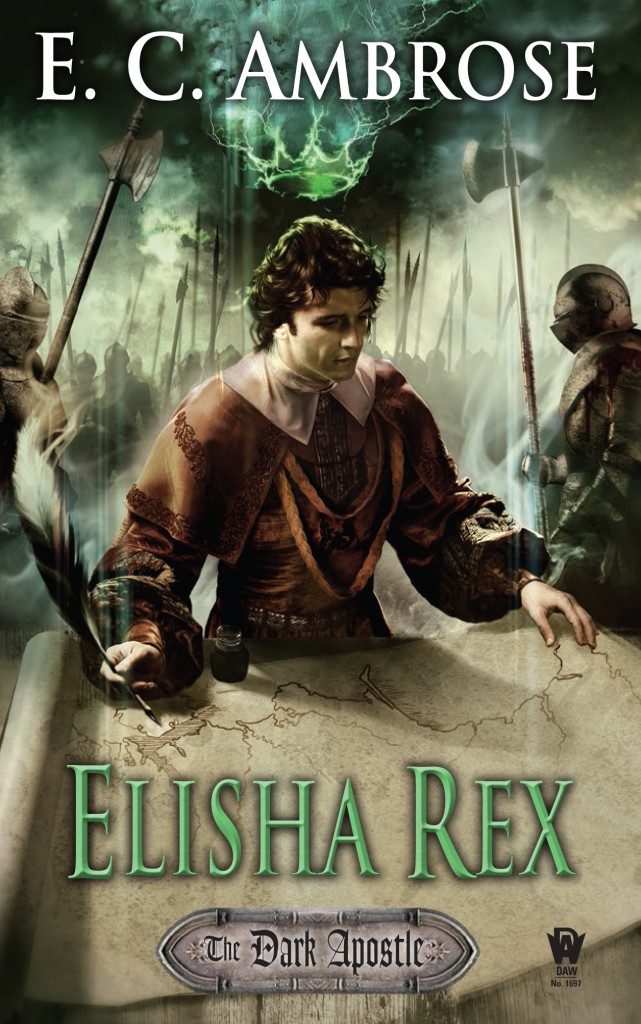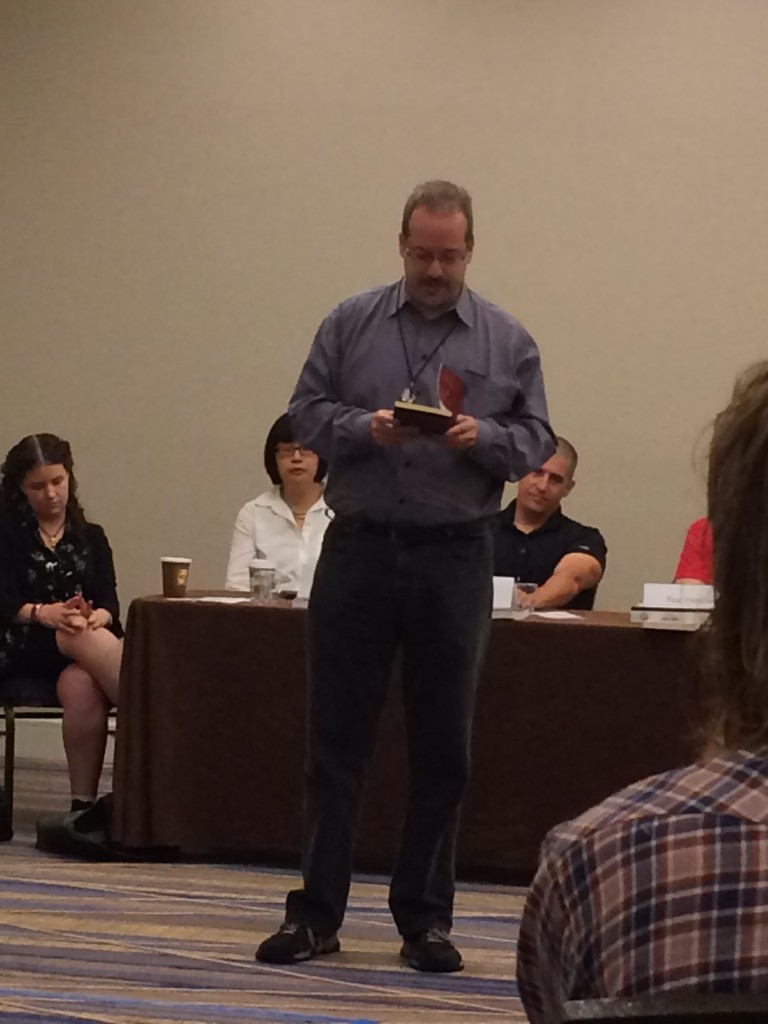
This week on The Scariest Part, my guest is E.C. Ambrose, whose latest novel in the Dark Apostle series is Elisha Rex. Here’s the publisher’s description:
Elisha was once a lowly barber-surgeon, cutting hair and stitching wounds for poor peasants like himself in 14th century London. But that was before: before he was falsely accused of murder, and sent to die in an unjust war. Before he discovered his potential for a singularly deadly magic. Before he was forced to embrace his gifts and end the war…by using his newfound abilities to kill the tyrannical king.
So who is Elisha now? The beautiful witch Brigit, his former mentor, claims him for the magi, all those who have grasped the secrets of affinity and knowledge to manipulate mind and matter, and who are persecuted for it. Duke Randall, the man who first rose against the mad King Hugh, has accepted him as a comrade and ally in the perilous schemes of the nobility. Somehow, he has even become a friend to Thomas, both the rightful king and, something finer, a good man.
But there is another force at work in the world, a shadowy cabal beyond the might of kings and nobles, that sees its opportunity in the chaos of war and political turmoil — and sees its mirror in Elisha’s indivisible connection with Death. For these necromancers, Elisha is the ultimate prize, and the perfect tool.
When the necromancers’ secret plans begin to bear black fruit and King Thomas goes missing, England teeters on the brink of a hellish anarchy that could make the previous war look like a pleasant memory. Elisha may be the only man who can stop it. But if he steps forward and takes on the authority he is offered to save his nation, is he playing right into the mancers’ hands?
Why does it seem like his enemies are the ones most keen to call him Elisha Rex?
And now, let’s hear what the scariest part was for E.C. Ambrose:
One of the great things about writing the Dark Apostle novels has been researching and revealing the world of medieval surgery, a dark and dangerous realm of miscarriages, amputations and physician-ordered bleedings, where learned medical practioners believed that your astrological sign and the balance of your humors mattered more than your actual symptoms or the circumstances of the ailment. It’s a fascinating milieu for fiction, in part because the stakes are high, and yes, it does tend to make some of the audience (and sometimes the author) a little squeamish.
But even in this disturbing array of medical tactics, there is one operation so notorious that it looms above all others, even in today’s modern consciousness. Nowadays, open-heart surgery is commonplace, and most of us probably know someone who’s undergone it. Amputations are much less frequent than they once were, and, even when they are necessary, prosthetic technology provides opportunities for living that simply didn’t exist even a hundred years ago, never mind in the 14th century, when these books are set. But the idea of someone cutting open your skull and intruding into your brain, even with contemporary tools, techniques and knowledge still brings a chill to the heart and makes the scalp tingle. How much more so when you imagine undergoing trepanation, the medieval version of intracranial surgery.
This operation has taken on a special horror in modern consciousness because of the myth that it was most commonly used to “relieve” migraine headaches or to perform other sorts of neurological or psychiatric interventions. In fact, the operation is only recommended in the manuals of the time for compressed skull fracture, when a severe blow to the head (as might have been common in battle or accident) creates shards of bone that press on the brain underneath, a condition that can cause swelling of the brain, brain damage and death.
In order to perform the operation (according to Guy de Chauliac’s Chirurgia Magna) the surgeon must shave the head of the patient in the area of the wound, then perform a cruciform incision, cutting through the scalp in the shape of the cross to peel back the skin and expose the fracture. A small drill is then used to pierce a series of holes around the fracture. Through these perforations, a tool is introduced into the skull cavity to lift the sections of bone back into place. The perforations, and any sharp edges of bone, are lightly filed to remove any sharp edges that might cause further damage before the scalp is replaced and stitched back up again.
In short, without benefit of anesthetics or an MRI, without washing his hands or sterilizing his tools, by lantern light on an ordinary table, the surgeon will cut a series of holes in your head and fish around with an iron rod, all in an effort to save your life. The careful surgeon will be able to avoid piercing the dura, the thick covering of the brain, with either the drill bit or the probe and files. I understand the worst part is the anticipation, well, that and the sound of the drill echoing through the conductive bone of your skull.
Even today, surgeons are extremely cautious about cutting into the skull, and patients are justly cautious about allowing it, so the idea of a character I loved undergoing trepanation was both compelling and horrifying. And thus, it had to be done…
E.C. Ambrose: Website / Blog / Facebook / Twitter
Elisha Rex: Amazon / Barnes & Noble / Powell’s / IndieBound
E. C. Ambrose is the author of “The Dark Apostle” series of adventure-based historical fantasy novels, beginning with Elisha Barber from DAW Books, and continuing in Elisha Magus, and Elisha Rex. Published works include “Spoiler Alert” and “The Romance of Ruins” in Clarkesworld Magazine and “Custom of the Sea,” winner of the Tenebris Press Flash Fiction Contest 2012. Additional stories are available in Fireside and through the Penguin Specials e-book program. The author is both a graduate of and an instructor for the Odyssey Writing workshop, and a participant in the Codex on-line neo-pro writers’ workshop. In addition to writing, E. C. works as an adventure guide, teaching rock climbing and leading hiking, kayaking, climbing and mountain biking camps. Past occupations include founding a wholesale business, selecting stamps for a philatelic company, selling equestrian equipment, and portraying the Easter Bunny on weekends. The author spends too much time in a tiny office in New Hampshire with a mournful black lab lurking under the desk.




